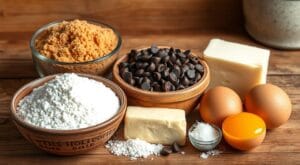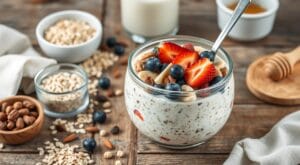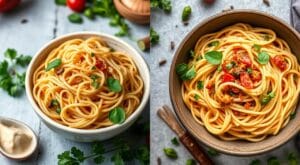Jump to:
Estimated reading time: 17 minutes
Table of contents
What do you eat on a carnivore diet? The carnivore diet is a strict eating plan that only includes meat, fish, and animal products. It doesn’t allow any plant-based foods like fruits, vegetables, or grains. Some people say it helps with weight loss, mental health, and managing health issues. But, experts worry about the lack of scientific studies and the diet’s lack of essential nutrients.
This diet is different from keto or Atkins because it doesn’t just limit carbs. It removes all carbs and other food groups, focusing only on animal protein sources and animal-based foods. It’s seen as a return to our ancient diet, where we ate mostly meat-only or all-meat. Yet, the scientific proof for its health benefits is still limited and mostly based on personal stories.
What do you eat on a carnivore diet? Key Takeaways
- The carnivore diet consists solely of meat, fish, eggs, and dairy products, excluding all plant-based foods.
- Proponents claim the diet can aid in weight loss, improve mood, and manage blood sugar levels, but these benefits lack scientific support.
- The highly restrictive nature of the carnivore diet raises concerns about potential nutrient deficiencies and long-term sustainability.
- The carnivore diet differs from other low-carb diets like keto and Atkins by completely eliminating carbohydrates and plant-based foods.
- Nutrition experts do not recommend the carnivore diet due to its lack of dietary fiber, essential vitamins, and minerals found in plant-based foods.
What do you eat on a carnivore diet? Introduction
The carnivore diet has become more popular lately. It focuses on eating high-quality animal foods. This has sparked a lot of interest and debate in the health world.
This diet mainly includes meat, fish, eggs, and animal fats. It doesn’t include plant-based foods like fruits, vegetables, and grains. People who follow this diet think it can improve their health in many ways.
“The carnivore diet is a bold and controversial approach to nutrition that challenges the conventional wisdom surrounding a balanced, plant-based diet. As with any dietary shift, it’s essential to approach it with an open mind and a willingness to closely monitor one’s health and well-being.”
But, not everyone agrees with the carnivore diet. Some experts worry about not eating enough plant-based foods. These foods are important for getting vitamins, minerals, and fiber.
If you’re thinking about trying the carnivore diet, do it carefully. Know the good and bad points. This will help you decide if it’s right for you.
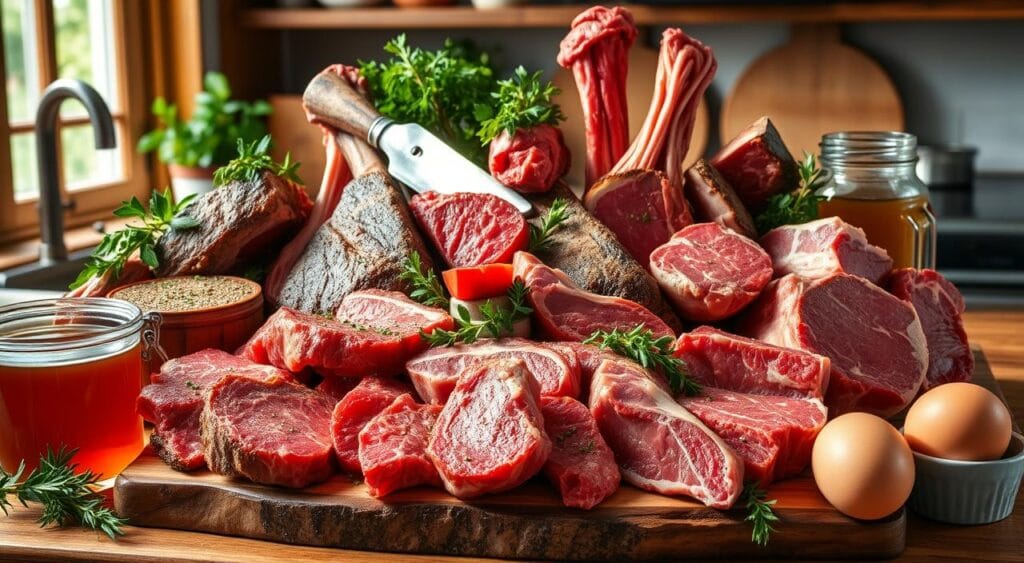
What do you eat on a carnivore diet? Understanding the Carnivore Diet
The carnivore diet is a diet that only includes meat, fish, eggs, and some dairy. It cuts out carbs to make the body burn fat for energy. People say it helps with weight loss, mood, and blood sugar, but there’s not much science to back it up.
What is the Carnivore Diet?
The carnivore diet, also called the all-meat diet or zero-carb diet, is very strict. You only eat animal products like meats, organs, seafood, and eggs. No fruits, veggies, grains, or legumes are allowed.
What do you eat on a carnivore diet? Key Principles of Carnivore Diet Foods
- Focus on nutrient-dense, high-quality animal proteins
- Eliminate all plant-based foods, including carbohydrates
- Consume small amounts of low-lactose dairy products, if tolerated
- Encourage the body to enter a state of ketosis for fat-burning
What do you eat on a carnivore diet? Benefits of Choosing Carnivore Diet Foods
Some people think the carnivore diet has benefits. These include:
- Potential weight loss and improved body composition
- Better blood sugar regulation, especially for those with diabetes
- Reduced inflammation and improved gut health
- Increased mental clarity and improved mood
But, the carnivore diet is still a topic of debate. It might not be right for everyone. Always talk to a doctor before trying a new diet.
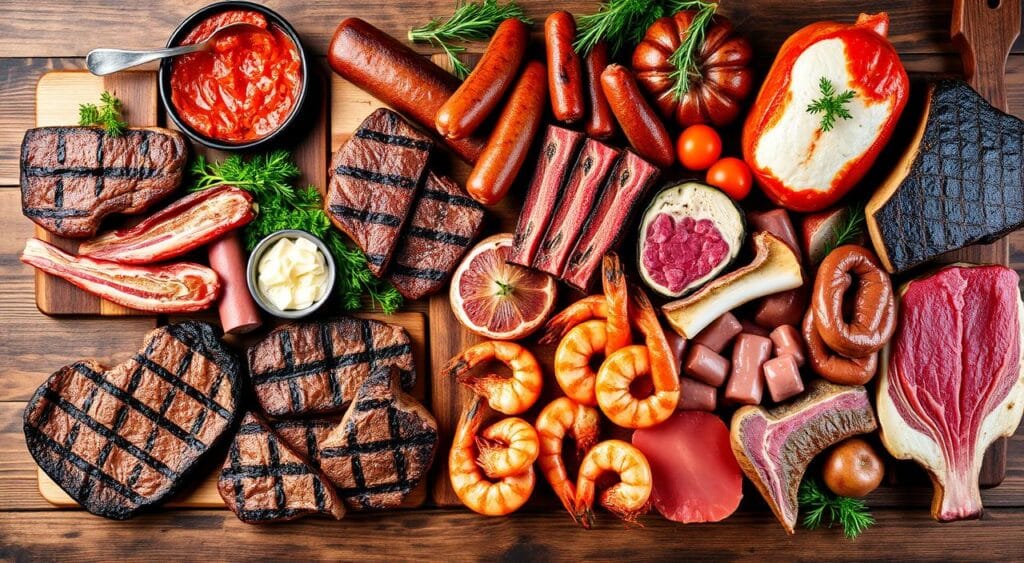
Essential Carnivore Diet Foods to Include
The carnivore diet focuses on eating only meat. It offers a variety of animal-based foods. These include high-quality animal protein sources like beef, and lamb. Also, organ meats and seafood are part of the diet.
What do you eat on a carnivore diet? High-Quality Meats: Beef, and Lamb
Beef, and lamb are key animal-based foods in the carnivore diet. They are rich in protein, amino acids, and vitamins. Choose grass-fed and pasture-raised options for better nutrition.
What do you eat on a carnivore diet? Organ Meats: Liver, Kidney, and Heart
Organ meats like liver, kidney, and heart are recommended. They are full of nutrients like vitamin A, B12, copper, and iron. Adding them to your diet helps meet nutritional needs.
What do you eat on a carnivore diet? Seafood and Fish Options
The diet also includes seafood and fish. Salmon, mackerel, and sardines are good for omega-3 fatty acids. But, watch out for contaminants like microplastics or heavy metals.
The carnivore diet emphasizes high-quality animal-based foods. It ensures a nutrient-rich and fulfilling diet. With meat-only diet options, organ meats, and seafood, it offers a wide range of animal protein sources.
Carnivore Diet Foods for Breakfast
Starting your day with the carnivore diet means eating only animal-based foods. This diet is high in protein and low in carbs. It gives you a full and energizing morning. Try beef bacon and eggs or a rich carnivore omelette with cheese for a tasty breakfast.
Beef Bacon and Eggs
Beef bacon is rich in flavor and protein, making it great with eggs. Together, they offer a filling and energizing start. They help keep your blood sugar stable and give you energy all morning.
Carnivore Omelette with Cheese
A carnivore omelette is a tasty and easy breakfast. It’s filled with cheese and meats, making it packed with protein. This dish will keep you full until lunch.
Steak and Eggs Breakfast
For a bigger breakfast, try steak and eggs. The juicy steak and eggs give you a full and energizing meal. This breakfast fits well with the carnivore diet’s high-protein, low-carb rules.
“Breakfast on a carnivore diet is vital for kickstarting metabolism through animal proteins and fats, leading to increased energy expenditure.”
Meat-based breakfasts are full of amino acids and nutrients. They help keep your blood sugar stable and give you steady energy. Eating animal protein sources for breakfast fuels your body and starts your day off right.
Carnivore Diet Foods for Lunch
The carnivore diet focuses on animal-based protein sources. It offers many tasty and filling lunch options. You don’t have to eat the same thing every day. There are many flavorful and nutritious meals to choose from.
Grilled Chicken Salad without Vegetables
A grilled chicken salad without veggies is a great lunch choice. It’s packed with protein from the chicken and fresh greens. This meal fits well with the meat-only diet. Add a creamy animal-based dressing for extra taste.
Ribs and Bone Broth
Ribs with bone broth make for a tasty lunch. The animal protein sources in this meal are very satisfying. The bone broth adds important nutrients for health.
Tuna Steak Lettuce Wraps
Tuna steak lettuce wraps are a light yet satisfying option. The tuna steak is a great protein source. The lettuce wraps are low in carbs and full of nutrients.
“Embracing the carnivore diet doesn’t mean sacrificing flavor or variety. These lunch options showcase the versatility and deliciousness of an animal-based approach to eating.”
| Lunch Option | Key Ingredients | Benefits |
|---|---|---|
| Grilled Chicken Salad without Vegetables | Grilled chicken, greens, animal-based dressing | High in protein, low in carbs, supports satiety |
| Ribs and Bone Broth | Ribs, bone broth | Provides essential nutrients from animal sources, satisfying and nourishing |
| Tuna Steak Lettuce Wraps | Tuna steak, lettuce leaves | Lean protein from wild-caught fish, low-carb and nutrient-dense |
Carnivore Diet Foods for Dinner
As the day ends, meat-only diet fans can enjoy many tasty dinner choices. This section highlights animal protein sources that make the Carnivore Diet versatile. It lets followers have rich, tasty meals without plant-based foods.
Ribeye Steak with Herb Butter
A ribeye steak cooked just right and topped with herb butter is a treat. The beef’s richness and the butter’s flavor make a perfect mix. It’s filling and packed with nutrients.
Roasted Lamb Chops
Roasted lamb chops are a great choice for a Carnivore Diet dinner. This animal protein source is tasty and different from beef. Seasoned with salt, pepper, and garlic, these chops are a delicious meal.
Baked Salmon with Lemon Butter
Baked salmon with lemon butter is a seafood option. The fish is full of omega-3s, a key animal protein source. The lemon butter adds a tangy flavor that goes well with the salmon. It’s a tasty and healthy part of the Carnivore Diet.
| Meal | Ingredients |
|---|---|
| Ribeye Steak with Herb Butter | Ribeye steak, unsalted butter, fresh herbs (such as rosemary, thyme, and parsley), salt, and pepper |
| Roasted Lamb Chops | Lamb chops, salt, pepper, and optional garlic |
| Baked Salmon with Lemon Butter | Salmon fillets, unsalted butter, lemon juice, salt, and pepper |
These dinner ideas for the Carnivore Diet offer a variety of tastes and nutrients. They focus on high-quality meats, fish, and dairy. This way, followers can enjoy tasty meals that fit the meat-only diet.
Carnivore Diet Foods for Snacks
Snacks on the carnivore diet are all about animal-based foods. You can make homemade beef jerky. These snacks are rich in protein and help you stay on the diet’s meat-only path.
Beef Jerky Homemade
Making your own beef jerky lets you pick the ingredients. You can use grass-fed beef and simple spices. This way, you get a tasty, meaty snack that fits the carnivore diet.
Lamb Cracklings
Lamb cracklings, or lamb rinds, are crunchy and protein-rich. By air-frying or baking lamb skins, you avoid oils and seasonings. This makes them a great snack for the carnivore diet.
Cheese and Cold Cuts Platter
Creating a platter with high-quality cheeses and meats is a great snack idea. Choose grass-fed, hormone-free options like aged cheddar and prosciutto. This platter is full of flavor and nutrients, fitting the carnivore diet perfectly.
| Carnivore Diet Snack | Protein Content | Nutrient Benefits |
|---|---|---|
| Beef Jerky | 24g per 1 oz serving | High in protein, low in carbs, and a good source of iron and zinc. |
| Lamb Cracklings | 9g per 1 oz serving | Provides protein, healthy fats, and vitamin D. |
| Aged Cheese | 7g per 1 oz serving | Rich in calcium, protein, and beneficial fatty acids. |
| Deli Meats | 7g per 2 oz serving | High in protein and a good source of B vitamins. |
Adding these meat-based snacks to your day keeps your energy up and cravings satisfied. They help you stick to the carnivore diet’s focus on animal proteins.
Meal Planning Carnivore Diet Foods
Planning meals for a meat-only diet needs a smart plan to meet your nutritional needs. Create a weekly carnivore diet meal plan and a detailed shopping list. This makes the diet easier and more sustainable over time.
Creating a Weekly Carnivore Meal Plan
Begin by planning your meals for the week. Use a variety of animal protein sources like beef, lamb , lamb, poultry, fish, and eggs. This ensures you get all the nutrients you need. Try different cooking methods to keep your meals tasty and interesting.
Shopping List Essentials for Carnivore Diet Foods
- High-quality, grass-fed or pasture-raised meats
- Fresh, wild-caught seafood
- Eggs from free-range or pasture-raised chickens
- Butter, ghee, or tallow for cooking
- Cheese, yogurt, or other low-lactose dairy products (if tolerated)
- Bone broth or stock
- Condiments and seasonings, such as salt, pepper, and herbs
Batch Cooking and Meal Prep Strategies
Batch cooking and meal prep save time and make the meat-only diet easier. Cook big batches of protein-rich foods like roasted chicken, grilled steak, or baked salmon. Then, portion them out for the week. Prepare hard-boiled eggs, pre-cooked bacon, or marinated meat for quick snacks and meals.
| Meal | Carnivore Diet Foods |
|---|---|
| Breakfast | Scrambled eggs with bacon, beef sausage, or a steak and egg omelet |
| Lunch | Grilled chicken salad with a side of roasted lamb belly |
| Dinner | Ribeye steak with a side of sautéed liver and onions |
| Snacks | Beef jerky, lamb rinds, or a cheese and cold cut |
Plan your meals, stock up on key animal protein sources, and use batch cooking. This makes the meat-only diet easy and enjoyable.
Carnivore Diet Foods for Special Occasions
The carnivore diet focuses on animal proteins, making it perfect for special events. Whether it’s a holiday feast or a backyard barbecue, there are many tasty options. Enjoy delicious and carnivore-friendly dishes at any occasion.
Holiday Roasts and Feasts
For holiday meals, choose meat-based dishes that wow your guests. A prime rib or leg of lamb is a great centerpiece. A beef or lamb roast is also impressive. Pair these with sides like roasted Brussels sprouts or creamy mashed cauliflower.
Carnivore-Friendly BBQ Recipes
As the weather warms up, grill up some meaty delights. Grilled steaks, lamb chops, and sausages are all great choices. Try beef ribs or lamb skewers for something special. Don’t miss out on bacon-wrapped hot dogs or a smoked brisket for a meat lover’s treat.
Gourmet Carnivore Dishes for Entertaining
For fancy dinners, show off with gourmet carnivore dishes. Start with pan-seared duck breasts, venison tenderloin, or wagyu beef carpaccio. Main courses can be butter-basted filet mignon, rack of lamb, or a whole roasted fish like salmon or sea bass.
By focusing on high-quality animal proteins, you can make unforgettable meals. These dishes will please both your dietary preferences and your guests’ palates.
Advanced Carnivore Diet Foods
If you’re on the meat-only diet, adding advanced carnivore diet foods can boost your nutrition. By trying different animal proteins, you can make your diet more balanced and full of nutrients.
Incorporating Organ Meats for Nutritional Balance
Organ meats like liver, kidney, and heart are superfoods. They’re full of vitamins, minerals, and healthy fats. Adding them to your diet can help meet your body’s nutritional needs.
Exploring Different Meat Cuts and Their Uses
There’s more to meat-only diets than just steaks and chops. Try oxtail, brisket, flank steak, and short ribs for new flavors and nutrients. Each meat has its own uses and health benefits.
Utilizing Bone Marrow and Other Fatty Meats
Fatty meats and bone marrow are key for carnivores. They’re packed with good fats and vitamins A and K. Adding these foods can make your meat-based meals even healthier.
| Organ Meats | Alternative Meat Cuts | Fatty Meats |
|---|---|---|
| Liver, Kidney, Heart | Oxtail, Brisket, Flank Steak, Short Ribs | Beef Tallow, Lamb Fat, Lamb Belly, Bone Marrow |
Exploring these advanced animal proteins can make your meat-only diet more varied and nutritious. It unlocks the best of the carnivore lifestyle.
“Incorporating organ meats and fatty cuts into your carnivore diet can be a game-changer for your overall health and well-being.”
Common Challenges with Carnivore Diet Foods
The zero-carb, animal-based carnivore diet is popular but comes with challenges. It can be hard to deal with meal boredom and make sure you get all the nutrients you need. To succeed, you must navigate these obstacles carefully.
Dealing with Meal Monotony
The diet focuses mainly on meat, fish, eggs, and some dairy. This can lead to boredom and a lack of interest in eating. To avoid this, you need to be creative in the kitchen. Try different meats, experiment with recipes, and add color and texture to your meals.
Ensuring Adequate Nutrient Intake
By cutting out fruits, veggies, grains, and legumes, you might miss out on important nutrients. It’s hard to get all the vitamins, minerals, and fiber you need on a zero-carb diet. To stay healthy, consider supplements and eating nutrient-rich organ meats. Always check with a doctor to make sure you’re getting enough.
Overcoming Social and Dining Out Hurdles
- Going out to eat or socializing can be tough on the carnivore diet. Restaurants usually offer a wide range of foods, not just zero-carb options.
- When you travel or eat with others, you need to plan ahead. Be clear about your diet and be ready to make choices or skip some meals.
Be creative, disciplined, and flexible to overcome the carnivore diet’s challenges. By tackling meal boredom, ensuring you get enough nutrients, and handling social situations, you can make this diet work for you. This way, you can stay healthy and happy while following the zero-carb diet.
Tips for Success with Carnivore Diet Foods
Starting a meat-only diet, like the carnivore diet, needs careful planning. You must ensure your body gets the right nutrients and stays hydrated. Follow these tips to make your carnivore diet journey successful and lasting.
Staying Hydrated and Maintaining Electrolyte Balance
One big challenge on a meat-only diet is keeping hydrated and balanced electrolytes. Your body uses animal proteins as its main fuel, which can lead to losing fluids and electrolytes. Drink lots of water, still or sparkling, all day. You might also need to add foods or drops rich in electrolytes like sodium, potassium, and magnesium.
Listening to Your Body’s Hunger and Fullness Cues
The carnivore diet relies on your body’s natural hunger and fullness signals. Listen to when you’re really hungry and when you’re full. Don’t eat just because it’s time to. This way, you’ll eat the right amount and balance your nutrients.
Tracking Progress and Adjusting Carnivore Diet Foods
Keeping track of your diet progress is key. Use a food journal, take photos, and monitor how you feel. This helps you see what works and what doesn’t. You might need to change your meat choices or add organ meats for extra nutrients.
By following these tips, you’ll be on the right path to your health and wellness goals. Enjoying an all-meat diet can be rewarding.
Carnivore Diet Foods Myths Debunked
The carnivore diet focuses on animal-based foods. Many myths and misconceptions surround it. People worry about its nutritional value, heart health, and scientific backing. But, a closer look reveals a more balanced view of this diet.
Addressing Misconceptions About Meat-Only Diets
One myth is that a meat-only diet lacks essential nutrients. Yet, a well-planned carnivore diet can meet nutritional needs. High-quality meats, organ meats, and dairy products provide key nutrients like calcium and magnesium.
Clarifying Nutritional Concerns
Concerns about heart health from the carnivore diet have been debunked. Studies show no link between fresh meat and heart disease. Unprocessed red meat doesn’t raise heart disease risk, research finds.
Scientific Evidence Supporting Carnivore Diet Foods
Despite myths, scientific evidence supports the carnivore diet. Research shows no link between red meat and colon cancer. A 2021 survey of over 2,000 people on the diet found health improvements in sleep, fatigue, and mental health.
Frequently Asked Questions: What do you eat on a carnivore diet?
What foods can you eat on a carnivore diet?
On a carnivore diet, you eat only animal-based foods. This typically includes meats like beef, pork, lamb, chicken, and fish, along with eggs, animal fats, and sometimes dairy products like cheese and butter.
Can you eat organ meats on a carnivore diet?
Yes, organ meats like liver, heart, and kidneys are often included on a carnivore diet. They provide essential vitamins and minerals, such as B vitamins and iron, which can help prevent nutrient deficiencies.
Are dairy products allowed on a carnivore diet?
Dairy products, such as cheese, butter, and cream, are allowed in some versions of the carnivore diet. However, stricter versions may exclude dairy due to potential lactose intolerance or concerns about inflammation.
Can you drink anything other than water on a carnivore diet?
Water is the main beverage on a carnivore diet. Some people also drink coffee or tea, though purists may avoid these since they come from plants. Bone broth is another option, as it’s made from animal products and provides extra nutrients.
Are processed meats like bacon allowed on a carnivore diet?
Processed meats like bacon and sausage can be eaten on a carnivore diet, but it’s best to choose minimally processed options without added sugars or fillers. Look for high-quality, nitrate-free options when possible.
Conclusion
In conclusion, the carnivore diet is a highly restrictive eating plan that focuses solely on animal-based foods such as meat, fish, eggs, and some dairy products like cheese and butter. It eliminates all plant-derived foods, including fruits, vegetables, grains, nuts, and seeds. Proponents believe that this diet can offer benefits like weight loss and improved mental clarity. However, because it excludes a wide range of nutrient-rich foods, there may be potential risks of nutrient deficiencies. It’s important to approach the carnivore diet with caution and consult a healthcare professional before making significant dietary changes.

